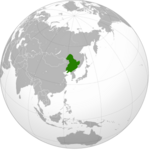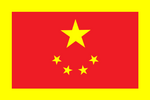People's Republic of New Manchuria: Difference between revisions
Makkapakka (talk | contribs) No edit summary |
Makkapakka (talk | contribs) No edit summary |
||
| (10 intermediate revisions by 2 users not shown) | |||
| Line 1: | Line 1: | ||
{{wip}} | {{wip}} | ||
{{Infobox geopolitical organization | {{Infobox geopolitical organization | ||
|conventional_long_name = | |conventional_long_name = Canton Republic | ||
|native_name = {{lang|zh| | |native_name = {{lang|zh|粵華共和國}} | ||
|image_flag = [[File: | |image_flag = [[File:Manchu_flag.png|150px]] | ||
|symbol_type = Emblem | |symbol_type = National Emblem | ||
|image_symbol = [[File: | |image_symbol = [[File:Manchu_emblem.png|90px]] | ||
|anthem = [https://https://www.youtube.com/watch?v=Mn8PCytiLCs&ab_channel=MisterZh%C5%8Dnghu%C3%A1%E4%B8%AD%E5%8D%8E 《國父紀念歌》] | |||
|image_map = [[File:Manchuria_map.png|150px]] | |||
|anthem = [https://www.youtube.com/watch?v= | |capital = {{wp|Guangzhou}} | ||
|image_map = | |largest_city = {{wp|Guangzhou}} | ||
|capital = | |||
|largest_city = | |||
|languages_type =Official Languages: | |languages_type =Official Languages: | ||
|languages = {{hlist |[[Chinese language|Chinese]] |[[ | |languages = {{hlist |[[Chinese language|Chinese (Traditional)]] |[[Cantonese language|Cantonese]]}} | ||
|ethnic_groups = | |ethnic_groups = | ||
{{unbulleted list | {{unbulleted list | ||
|{{nowrap| | |{{nowrap|99% Han}} | ||
| 0.7% Zhuang | |||
| 0.2% Yao | |||
| 0. | | 0.1% Other | ||
| 0. | |||
| 0. | |||
}} | }} | ||
|government_type = Unitary one-party socialist state | |government_type = Unitary one-party socialist state | ||
| Line 35: | Line 31: | ||
|established_event2 = Japanese proclamation of Manchukuo | |established_event2 = Japanese proclamation of Manchukuo | ||
|established_date2 = March 1, 1932 | |established_date2 = March 1, 1932 | ||
| | |established_event3 = Proclamation of Independence | ||
| | |established_date3 = October 1, 1949 | ||
| | |established_event4 = Treaty of Changchun | ||
| | |established_date4 = August 17, 1951 | ||
|established_event5 = People's Revolution | |||
|established_date5 = June 8, 1965 | |||
|established_event10 = Current constitution | |established_event10 = Current constitution | ||
|established_date10 = October 1, 1989 | |established_date10 = October 1, 1989 | ||
|area_km2 = 1,216,840 | |area_km2 = 1,216,840 | ||
|area_sq_mi = 469,824 | |area_sq_mi = 469,824 | ||
|area_footnote = | |area_footnote = | ||
|percent_water = | |percent_water = | ||
|area_label = | |area_label = | ||
| Line 70: | Line 68: | ||
|utc_offset = | |utc_offset = | ||
|drives_on = right | |drives_on = right | ||
|calling_code = | |calling_code = {{wp|North American Numbering Plan|+89}} | ||
|cctld = [[.mz]] | |cctld = [[.mz]] | ||
|footnote1 = | |footnote1 = | ||
| Line 78: | Line 76: | ||
}} | }} | ||
Manchuria (Chinese: 满洲; pinyin: Mǎnzhōu), officially the '''People's Republic of New Manchuria'''(Chinese: 新满洲人民共和国; pinyin:Xīnmǎnzhōu Rénmín Gònghéguó) is a country in Northeast Asia. It is one of the most populous countries in the region, with a population of over 80 million. Covering an area of over 1.2 million square kilometres (469,000 square miles), the country consists of 161 counties (县) and the special economic region of Quanhedao. The national capital is [ | Manchuria (Chinese: 满洲; pinyin: Mǎnzhōu), officially the '''People's Republic of New Manchuria'''(Chinese: 新满洲人民共和国; pinyin:Xīnmǎnzhōu Rénmín Gònghéguó) is a country in Northeast Asia. It is one of the most populous countries in the region, with a population of over 80 million. Covering an area of over 1.2 million square kilometres (469,000 square miles), the country consists of 161 counties (县) and the special economic region of Quanhedao. The national capital is {{wp|Harbin}}. | ||
Manchuria existed as a primarily Chinese-controlled region until the 20th century, when in 1932 the region was declared as the State of Manchukuo under Japanese occupation. Manchuria declared independence on the same day as the People's Republic of China on October 1st, 1949 as the People's State of Manchuria and existed in a state of limbo until the extent of its territory and its formal relationship with the People's Republic of China was formally declared under the 1951 Treaty of Changchun. As such, dates like the date of the signing of the Treaty and that of the 1965 People's Revolution are often considered more important to Manchurian history than the original declaration of independence. Between the declaration of independence and the People's Revolution in 1965, the state, still weakened from the Japanese occupation was ruled by the autocratic National Manchurian Diet. It was estimated that over a million people died during the rule of the Diet. Another close ally of the country is the [[Canton Republic.]] | |||
The China-backed People's Revolution in 1965 installed the current government (the Communist Party of Manchuria) and established a stable regime in the region. | |||
Latest revision as of 14:52, 22 March 2022
This article is incomplete because it is pending further input from participants, or it is a work-in-progress by one author. Please comment on this article's talk page to share your input, comments and questions. Note: To contribute to this article, you may need to seek help from the author(s) of this page. |
Canton Republic 粵華共和國 | |
|---|---|
Anthem: 《國父紀念歌》 | |
 | |
| Capital and largest city | Guangzhou |
| Official Languages: | |
| Ethnic groups |
|
| Demonym(s) | New Manchurian |
| Government | Unitary one-party socialist state |
• Premier | Hu Changsheng |
• President | Yu Feiqiang |
| Legislature | New Manchurian National Congress |
| Establishment | |
• First Northeast Dynasty | c. 1400 |
• Japanese proclamation of Manchukuo | March 1, 1932 |
• Proclamation of Independence | October 1, 1949 |
• Treaty of Changchun | August 17, 1951 |
• People's Revolution | June 8, 1965 |
• Current constitution | October 1, 1989 |
| Area | |
• | 1,216,840 km2 (469,820 sq mi) |
| Population | |
• 2021 estimate | 83,934,039 |
• Density | 68.9/km2 (178.5/sq mi) |
| GDP (nominal) | 2021 estimate |
• Total | $601.303 Billion |
• Per capita | $7,163 |
| Gini (2021) | high |
| HDI (2021) | high · 16th |
| Currency | Xinmanzhou Minbi ($) ((MB)) |
| Time zone | (UTC+8) |
| Driving side | right |
| Calling code | +89 |
| Internet TLD | .mz |
Manchuria (Chinese: 满洲; pinyin: Mǎnzhōu), officially the People's Republic of New Manchuria(Chinese: 新满洲人民共和国; pinyin:Xīnmǎnzhōu Rénmín Gònghéguó) is a country in Northeast Asia. It is one of the most populous countries in the region, with a population of over 80 million. Covering an area of over 1.2 million square kilometres (469,000 square miles), the country consists of 161 counties (县) and the special economic region of Quanhedao. The national capital is Harbin.
Manchuria existed as a primarily Chinese-controlled region until the 20th century, when in 1932 the region was declared as the State of Manchukuo under Japanese occupation. Manchuria declared independence on the same day as the People's Republic of China on October 1st, 1949 as the People's State of Manchuria and existed in a state of limbo until the extent of its territory and its formal relationship with the People's Republic of China was formally declared under the 1951 Treaty of Changchun. As such, dates like the date of the signing of the Treaty and that of the 1965 People's Revolution are often considered more important to Manchurian history than the original declaration of independence. Between the declaration of independence and the People's Revolution in 1965, the state, still weakened from the Japanese occupation was ruled by the autocratic National Manchurian Diet. It was estimated that over a million people died during the rule of the Diet. Another close ally of the country is the Canton Republic.
The China-backed People's Revolution in 1965 installed the current government (the Communist Party of Manchuria) and established a stable regime in the region.

